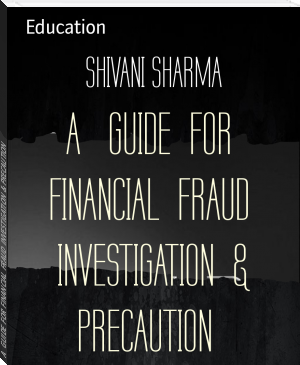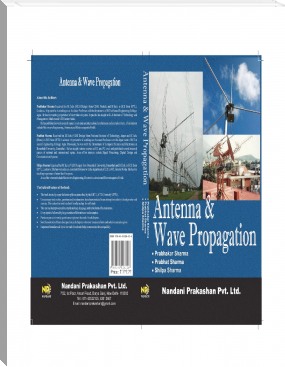A GUIDE FOR FINANCIAL FRAUD INVESTIGATION & PRECAUTION, SHIVANI SHARMA [read my book txt] 📗

- Author: SHIVANI SHARMA
Book online «A GUIDE FOR FINANCIAL FRAUD INVESTIGATION & PRECAUTION, SHIVANI SHARMA [read my book txt] 📗». Author SHIVANI SHARMA
(f) to summon and record the statements of persons concerned [Section 50].
15)The powers of authority during survey:- An authority during the survey may—
(i) place marks of identification on the records inspected by him and make or cause to be made extracts or copies therefrom;
(ii) make an inventory of any property checked or verified by him; and
(iii) record the statement of any person present in the place which may be useful for, or relevant to, any proceeding under this Act [Section 16].
16) THE possible actions which can be taken against persons / properties involved in Money Laundering:- Following actions can be taken against the persons involved in Money Laundering:-
(a) Attachment of property under Section 5, seizure/ freezing of property and records under Section 17 or Section 18. Property also includes property of any kind used in the commission of an offence under PMLA, 2002 or any of the scheduled offences.
(b) Persons found guilty of an offence of Money Laundering are punishable with imprisonment for a term which shall not be less than three years but may extend up to seven years and shall also be liable to fine [Section 4].
(c) When the scheduled offence committed is under the Narcotics and Psychotropic substances Act, 1985 the punishment shall be imprisonment for a term which shall not be less than three years but which may extend up to ten years and shall also be liable to fine.
(d) The prosecution or conviction of any legal juridical person is not contingent on the prosecution or conviction of any individual.
17).The powers of officers / authority during search and seizure:- Authorised officer may —
(a) enter and search any building, place, vessel, vehicle or aircraft where he has reason to suspect that such records or proceeds of crime are kept;
(b) break open the lock of any door, box, locker, safe, almirah or other receptacle where the keys thereof are not available; 14
(c) seize any record or property found as a result of such search;
(d) place marks of identification on such record or properties if required or make or cause to be made extracts or copies therefrom;
(e) make a note or an inventory of such record or property;
(f) examine on oath any person, who is found to be in possession or control of any record or property, in respect of all matters relevant for the purposes of any investigation under this Act; and
(g) where it is not practicable to seize such record or property, the officer authorized may make an order to freeze such property, whereupon the property shall not be transferred or otherwise dealt with, except with the prior permission of the officer making such order [Section 17].
18)What is the time limit for retention of records or property seized during search & seizure? What is the time limit for continuation of the order of freezing of property/records frozen during search and seizure?
The property / record may, if seized be retained or if frozen may continue to remain frozen for a period not exceeding 180 days from the day on which such property or record were seized or frozen, unless the Adjudicating Authority under PMLA permits retention of such record or property beyond the period of 180 days [Sections 20 & 21].
19). The rights of persons being searched during search;-
(i) Where an authority is about to search any person, he shall, if such person so requires, take 15 such person within twenty-four hours to the nearest Gazetted Officer, superior in rank to him, or a Magistrate.
(ii) If the requisition is made, the authority shall not detain the person for more than twenty-four hours prior to taking him before the Gazetted Officer, superior in rank to him, or the Magistrate referred to in that sub-section.
(iii) The Gazetted Officer or the Magistrate before whom any such person is brought shall, if he sees no reasonable ground for search, forthwith discharge such person but otherwise shall direct that search be made.
(iv) Search shall be made in the presence of two or more persons.
(v) No female shall be searched by any one except a female [Section 18].
20). the rights of persons during arrest:-
(i) The Authorized Officer making arrest shall, as soon as may be, inform the arrestee of the grounds for such arrest.
(ii) Every person so arrested shall, within twentyfour hours, be taken to a Judicial Magistrate or a Metropolitan Magistrate, as the case may be, having jurisdiction [Section 19].
21). the powers of Authorities regarding issuing summons, enforcing production of documents and to give evidence etc.:-
(i) The Director, Additional Director, Joint Director, Deputy Director or Assistant Director of the Directorate of Enforcement have the power to summon any person whose attendance he considers necessary whether to give evidence or to produce any records during the course of 16 any investigation or proceeding under this Act.
(ii) All the persons so summoned are bound to attend in person or through authorised agents, as such officer may direct, and are bound to state the truth upon any subject respecting which they are examined or make statements, and produce such documents as may be required.
(iii) Such proceedings are deemed to be judicial proceedings within the meaning of section 193 and section 228 of the Indian Penal Code (45 of 1860) [Section 50].
22)The time limit for retention of record impounded during the proceedings conducted under the PMLA, 2002:- Authorities empowered to issue summons may impound and retain in his custody for such period, as he thinks fit, any records produced before him in any proceedings under this Act : Provided that an Assistant Director or a Deputy Director cannot—
(a) impound any records without recording his reasons for so doing;
or
(b) retain in his custody any such records for a period exceeding three months, without obtaining the previous approval of the Director [Section 50].
23)The presumptions in interconnected transactions?
Where money-laundering involves two or more inter- 17 connected transactions and one or more such transactions is proved to be involved in moneylaundering, then for the purposes of adjudication or confiscation or for the trial offence of money laundering, it shall, unless otherwise proved to the satisfaction of the Adjudicating Authority or the Special Court, be presumed that the remaining transactions form part of such inter-connected transactions [Section 23].
24)Whether the statement recorded before the Investigating Officer under PMLA is admissible evidence under the Law?
Yes, the statement recorded before the Investigating Officer under PMLA is admissible evidence in the Court as such a proceeding under Section 50(2) and 50(3) of the Act is a judicial proceeding within the meaning of Section 193 and 228 of IPC.
25) What is burden of proof in any proceedings relating to proceeds of crime under PMLA, 2002?
(a) In the case of a person charged with the offence of money-laundering under section 3, the Authority or Court shall, unless the contrary is proved, presume that such proceeds of crime are involved in money-laundering; and
(b) In the case of any other person the Authority or Court, may presume that such proceeds of crime are involved in money-laundering [Section 24].
26)What is meant by the term “Property” in the Prevention of Money Laundering Act, 2002?
“Property” means any property or assets of every 18 description, whether corporeal or incorporeal, movable or immovable, tangible or intangible and includes deeds and instruments evidencing title to, or interest in, such property or assets, wherever located. Further, property includes, property of any kind used in the commission of an offence under this Act or any of the scheduled offences [Section 2(1)(v)].
27)What is “attachment”?
“Attachment” means prohibition of transfer, conversion, disposition or movement of property by an order issued under Chapter III of the Act [Section 2(1)(d)].
28) The circumstances under which properties can be provisionally attached under PMLA:- (i) Where the Director, or any other officer not below the rank of Deputy Director authorised by the Director has reasons to believe (the reason for such belief to be recorded in writing), on the basis of material in his possession, that—
(a) any person is in possession of any proceeds of crime and
(b) such proceeds of crime or likely to be concealed, transferred or dealt with in any manner which may result in frustrating any proceedings relating to confiscation of such proceeds of crime he may, by an order in writing, provisionally attach such property for a period not exceeding 180 days from the date of the order, in such manner as may be prescribed. 19
(ii) No such order of attachment shall be made unless, in relation to the scheduled offence, a report has been forwarded to a Magistrate under section 173 of the Code of Criminal Procedure, 1973, or a complaint has been filed by a person authorized to investigate the offence mentioned in the Schedule, before a Magistrate or court for taking cognizance of the scheduled offence, as the case may be or a similar report or complaint has been made or filed under the corresponding law of any other country.
(iii) Further any property of any person may be attached, if the Director or any other officer not below the rank of Deputy Director authorized by him has reason to believe (reasons for such belief to be recorded in writing), on the basis of material in his possession, that if such property involved in money laundering is not attached immediately the non-attachment of the property is likely to frustrate any proceedings under this Act [Section 5].
29).How long this order of provisional attachment of property will remain in force?
Every order of provisional attachment shall cease to have effect after 180 days from the date of the order, if no order is passed by the Adjudicating Authority under PMLA that the said property is involved in moneylaundering. However, within said 180 days, if the Adjudicating Authority, by an order, records a finding that properties are not involved in money laundering, the order of provisional attachment shall cease to have 20 effect from the date of such order of the Adjudicating Authority [Section 5(3)].
30)Whether the persons claiming or entitled to claim any interest in the enjoyment of immovable property can enjoy the property during the period of provisional attachment?
Yes. [Section 5(4)]
31)What is the remedy available to a aggrieved person, where the property is provisionally attached?
It has been provided in the Act that before recording the finding that all or any of the properties are involved in money laundering, the Adjudicating Authority has to issue a show cause notice of not less than thirty days to the aggrieved person. The aggrieved person at this stage can submit his reply and attend the hearing before the Adjudicating Authority to present his defence [Section 8(1)].
32)What will happen if the Adjudicating Authority records the finding that the all or any of the properties are involved in money laundering?
Where the Adjudicating Authority decides that any property is involved in money-laundering, he shall, by an order in writing, confirm the attachment of the property. Such attachment shall—
(a) continue during the pendency of the proceedings relating to any offences under this Act before a court or under the corresponding law of any other country, before the competent court of criminal jurisdiction outside India, as the case may be; and 21
(b) becomes final after an order of confiscation is passed [Section 8(3)].
33)What will happen if the





Comments (0)